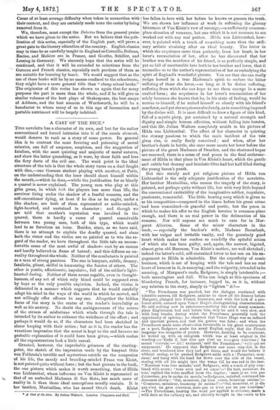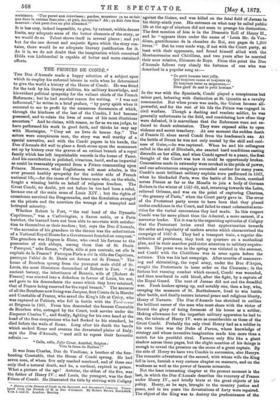A CAST OF THE DICE.*
Tins novelette has a character of its own, and but for the rather conventional and forced intrusion into it of the comic element, would deserve to rank as a story of some power. Its general idea is to contrast the most fevering and poisoning of moral miseries, one full of suspense, suspicion, and the suggestion of fatalism, with the most quieting and majestic of moral natures, and show the latter quenching, as it were, by sheer faith and love the fiery darts of the evil one. The weak point in the ideal structure of the tale is that the whole story turns on a duel fought with dice,—one German student playing with another, at Paris, on the understanding that the loser should shoot himself within the month,—which he does,—while the justification for so bloody a quarrel is never explained. The young men who play at this grim game, in which both the players lose more than life, the survivor living under the shadow of a fearful remorse, and the self-executioner dying, at least if he dies as he ought, under a like shadow, are both of them represented as noble-minded, light-hearted, and unstained in character ; and though we are told that another's reputation was involved in the quarrel, there is hardly a cause of quarrel conceivable between two young men, both of this type, which would lead to so ferocious an issue. Besides, since, as we have said, there is no attempt to explain the deadly quarrel, and since both the victor and the victim are so painted as to win the re- gard of the reader, we have throughout the little tale an uncom- fortable sense of the most awful of shadows cast by an unseen and hardly believed-in flame of hatred ; and this diffuses an un- reality throughout the whole. Neither of the combatants is painted as a man of strong passions. The one is buoyant, subtle, dreamy, fatalistic, pliant, skilful in humouring the fancies of others. The other is poetic, affectionate, impulsive, full of the soldier's light- hearted daring. Neither of them seems capable, even in thought- lessness, of any act of which only blood could be supposed even by boys as the only possible expiation. Indeed, the victim is delineated in a manner which suggests that he would carefully adapt his mind to the ways of the world in which he moved, and not willingly offer offence to any one. Altogether the hidden focus of the story is the centre of the reader's incredulity as well as his anxiety. No doubt the ambiguousness of the source of the stream of misfortune which winds through the tale is intended by its author to enhance the weirdness of the effect ; and perhaps it would do so, if the characters had been sketched in closer keeping with their action ; but as it is, the reader has the vexatious impression that the secret is kept to the end because no probable explanation of it could have been given,—which makes all the superstructure look a little unreal.
Granted, however, the improbable grimness of the starting- point, the sketch of the impression made by the buoyant Otto von Feldstein's terrible and mysterious suicide on the companion of his life, the moody and brooding-minded Franz von Kleist, is not painted quite without force ; but the best picture in the book, the one picture which makes it worth something, that of Hilda von Lichtenthal, whose influence on Von Kleist is represented as t that of an embodied Madonna di San Sisto, has much more of reality in it than these ideal conceptions usually contain. It is her brother, Maximilian, who has caused Otto's death. Kleist
• A Cali of the Dice. By Julian Walters. London Chapman and Hall.
has fallen in love with her before he knows or guesses the truth. We are shown her influence at work in softening the gloomy bitterness of Von Kleist's vow of revenge,—a sufficiently common- place situation of romance, but one which it is not common to see worked out with any real pathos. Hilda von Lichtenthal, how- ever, is painted with a touch of something more than the ordi- nary artistic straining after an ideal beauty. The letter in which she acquiesces more than patiently, from her heart, in her lover's renunciation of her, after he has discovered that her brother was the murderer of his friend, is so perfectly simple, and yet so full of unutterable love both to her brother and lover, that it reconciles us to the author's representation of her as embodying the spirit of Raphael's wonderful picture. You see that she can really resign herself in a true Madonna's spirit to endure the bitter suffering of those she loves,—so long as it be divine suffering, suffering from which she can hope to see them emerge in a more exalted form ; she acquiesces in her lover's renunciation of her solely becauses she knows that he, in his state of feeling, would be untrue to himself, if he united himself so closely with his friend's murderer, and yet she acquiesces absolutely, as in something imposed by the divine will. It is most difficult to draw a figure of this kind, full of a mystic piety, yet sustained by a natural strength and dignity and simple human affection, without falling into heroics, and this Mr. Julian Walters completely avoids in his picture of Hilda von Lichtenthal. The effect of her character in quieting the stormy passions to which the main incident of the tale gives rise, is really finely conceived ; and when, after her brother's death in battle, she once more meets her lover before the picture of the great Madonna of Dresden, and the shattered hopes are renewed, there is a sense of real peace in the final enthrone- ment of Hilda in that place in Von Kleist's heart, which the gentle and subtle but dreamy and fatalistic Otto had but half filled during the young baron's youth.
But this stately and yet religious picture of Hilda von Lichtenthal is the only adequate justification of the novelette. Her brother Maximilian, who causes the tragedy of the story, is painted, not perhaps quite without life, but with very little beyond the conventional excitability of the imaginative soldier, impulsive, passionate, remorseful. The little boating song which is given us as his composition—composed in the times before his great crime had been committed—is graceful and poetic, but the poem in which he makes his offer to the English heroine is common-place enough, and there is no real power in the delineation of his remorse. Nor will anyone see much to care for in Mar- garet Allerton. Some of the minor characters in the book, — especially the banker's wife, Madame Baumbach, with her vulgar and irritable vanity, and the genuinely good heart which makes her confess so candidly the spiteful action of which she has been guilty, and, again, the narrow, bigoted, almost grim old Baroness, Von Kleist's mother, are well sketched ;
indeed the latter's cold, self-restrained letter to her son on his en- gagement to Hilda is admirable. But the superfluity of comic
business, which is out of keeping with the tale and has no real heart of humour in it, is annoying; and the vulgarity, intended to be amusing, of Margaret's uncle, Redgrave, is simply intolerable ;— both meaningless and dull. Who can laugh at this specimen of blundering French, for instance, lugged in, as it is, without any relation to the story, simply to " lighten " it?—
" The Frenchman was puzzled, but the dialogue continued with, tolerable success, till Redgrave, anxious to show off his fluency before• Margaret, plunged into French literature, and with the look of a pro- found critic, entered upon Victor Hugo's distinguishing characteristics._ He said nothing new in substance—nothing but what many common- place Englishmen had said before him, only he said it very slow, and with long breaks, during which the Frenchman generally took the of spitting ; he observed that Victor Hugo was an inflated and ignorant person, and that his genius was false ; and when the Frenchman made some observation favourable to his great countryman, as a poet, Redgrave made the usual English reply, that the French language was incapable of poetry. However, desiring to be courteous,. be wound up with an enlogium which was at least original in the wording ;—' Enfin it faut dire que c'est un tres-gros ecrevisse ;' he meant Ah ! vraiment,' said the Frenchman ; ' voila qui est surprenant.' He supposed that Redgrave saw some tray-fish in the river, and wondered how they had got there, and would not believe it without seeing, so he pushed Redgrave aside with a ' Permettez, mon- sieur,' and hung with his head far down over the side of the vessel, staring with all his might into the water till he was red in the face. " Monsieur vous etes malade,' said Redgrave, with a touch of pity com- bined with scorn ; vons avez mal nu coeur.'—' Du tout, monsieur, dm tout,' replied the voice muffled from the depths ; 'male je ne vois pas d'dcrevisse, pas le moins du monde.'—Redgrave, satisfied, continued his- discourse slowly : Oui, monsieur, j'ai bien raisin, beaucoup raisins.'— Comment, monsieur, beaucoup de raisins 7'—'0ui, monsieur, et je die. que c'est un gros ecrevisse, mais que co n'est pas un pur ecrevisee —The Frenchman, hearing the word pur applied to &resins, made a wild dash at the culinary art, and cleverly brought in the raisin to his
assistance. 'Una puree aux dorevieses ; pardon, monsieur 9x ne se fait pas dane la cuisine francaise ; et pule, des raisins ? Ah ; ca dolt etre bien manvais &est pent-etre no plat allsmisnd."
It is less easy, indeed impossible, to give, by extract, within decent limits, any adequate sense of the better elements of the story, or we would do so. Talent shows itself in several places ; and yet but for the one devout and majestic figure which the story con- tains, there would be no adequate literary justification for it. As it is, we do not doubt that the imagination which conceived
Hilda von Lichtenthal is capable of better and more sustained efforts.



































 Previous page
Previous page